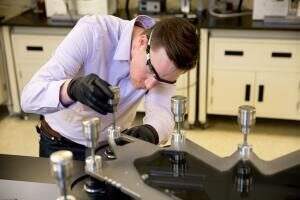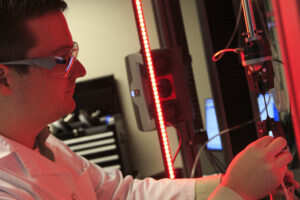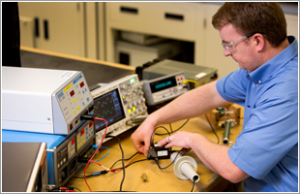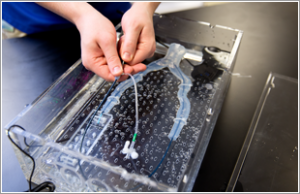Testing Services
Additional Testing
We have completed a wide variety of testing and are always validating new testing methodologies.
-
Abrasion Testing
 Physiologically, abrasion of a medical device is a potential failure mode for some long term implants. Understanding the clinically relevant motions and how to successfully test for abrasion on the bench is one of our capabilities.
Physiologically, abrasion of a medical device is a potential failure mode for some long term implants. Understanding the clinically relevant motions and how to successfully test for abrasion on the bench is one of our capabilities.TEST METHODS
· ASTM D4966
· ISO 12947-1
· ISO 12947-3
· Lab Developed Medical Device Testing Method MART-100
-
Physical Bench Measurement and Examination
Many minimally invasive devices are deployed with fluoroscopic guidance. We use fluoroscopy to simulate clinical procedures in a wide range of representative anatomies. We have two fluoroscopic suites available for simulated-use testing, and the tests can be viewed remotely through live broadcast.
Test Methods
· ISO 5084
· ASTM D1777
· ISO 7198
· ISO 25539 – 1, 2, 3
· Lab Developed Medical Device Testing Method MED-007
· Lab Developed Medical Device Testing Method MEAS-825
· Lab Developed Medical Device Testing Method MEAS-829
· Lab Developed Medical Device Testing Method MEAS-830
· Lab Developed Medical Device Testing Method MEAS-832
-
Immersion Corrosion
Real-time or accelerated immersion tests are an alternative to electrochemical corrosion tests. We have experience in simulating most body fluids and testing durations. We have run several long term immersion corrosion cycling studies evaluating the digestion process. Additionally, we have built custom anatomical models to simulate various aspects of immersion corrosion.
Test Methods
· ASTM F1980
· ASTM F1089
· ASTM G31
· ISO 10555
· ISO 11070
· Lab developed medical device testing method ACOR-716
-
Tensile and Compression
 Tensile testing is very important and setting relevant criteria around your medical device can be challenging. We frequently perform the full spectrum of tensile testing from raw materials for finite element (FE) inputs to final device subassembly testing. This has given us a complete understanding of the complexity that can occur during what is often seen as a simple bond strength test. Other tests that are commonly performed as part of a vascular device testing regimen: a determination of circumferential and longitudinal tensile strength of a textile, separation force for modular components, a measure of migration resistance, and a measure of the strength of a stent or an attachment system to a graft.
Tensile testing is very important and setting relevant criteria around your medical device can be challenging. We frequently perform the full spectrum of tensile testing from raw materials for finite element (FE) inputs to final device subassembly testing. This has given us a complete understanding of the complexity that can occur during what is often seen as a simple bond strength test. Other tests that are commonly performed as part of a vascular device testing regimen: a determination of circumferential and longitudinal tensile strength of a textile, separation force for modular components, a measure of migration resistance, and a measure of the strength of a stent or an attachment system to a graft.Test Methods
· ISO 10555
· Lab developed medical device testing method PULT-210
· ISO 25539 – 1, 2, 3
· BS EN 1615
· BS EN 1617
· BS EN 1618
· ASTM E8/E8M
· JIST 3213
· JIST 3247
· ASTM D412
· ISO 7198
· ISO 11070
· Lab Developed Medical Device Testing Method PULT-204
-
Crush Resistance and Local Compression
These tests use a wide range of testing techniques to characterize crush resistance and local compression for almost any device (stainless, superelastic, or absorbable) under multiple loading modes. The tests are performed in an environment that is representative of the clinical environment.
Test Methods
· ASTM F2606
· ISO 25539 – 1, 2, 3
· Lab developed medical device testing method COMP-220
· ASTM E9
· ASTM D695
-
Torque
During clinical procedures, the delivery systems of most devices must withstand the torque from operational use. MED has worked with devices in a number of clinical specialties and clinical environments and understands the different torque requirements of various materials and uses.
Test Methods
· ASTM A938
· Lab developed medical device testing method TORQ-553
· ISO 25539 – 1, 2, 3
-
Electrosurgical Accessory Testing
 We offer a full complement of electrosurgical accessory testing options that include a high- and low-frequency breakdown of handles and active electrodes. Testing also includes leakage, simulative use, and fatigue testing.
We offer a full complement of electrosurgical accessory testing options that include a high- and low-frequency breakdown of handles and active electrodes. Testing also includes leakage, simulative use, and fatigue testing.Test Methods
· IEC 60601-2-2
· IEC 60601-2-18
· Lab Developed Medical Device Testing Method ECT-491
-
Clinically Relevant Pressure and Flow Testing
 We use clinically relevant means of generating pressures and flow rates to characterize a medical device for labeling purposes or to compare to a specified acceptance criterion. Other tests in this category include integral water permeability, water entry pressure, flow rate characterization, leakage testing, and deployment under physiologically relevant pulsation.
We use clinically relevant means of generating pressures and flow rates to characterize a medical device for labeling purposes or to compare to a specified acceptance criterion. Other tests in this category include integral water permeability, water entry pressure, flow rate characterization, leakage testing, and deployment under physiologically relevant pulsation.Test Methods
· ISO 10555
· ISO 7198
· ISO 25539-3
· ASTM F1828
· ANSI/AAMI VP20
· Lab Developed Medical Device Testing Method PRES-01
· Lab Developed Medical Device Testing Method FLOW-302
· Lab Developed Medical Device Testing Method FLOW-100
· Lab Developed Medical Device Testing Method PRES-307
-
Securement
Devices that are mounted on balloons need to remain secure until the devices reach the intended target location. Determining the appropriate securement forces and then testing your medical devices in a repeatable manner is a very challenging endeavor. MED has done this before and has the methods and models for the majority of the vascular system (both arterial and venous) and has created a nearly complete model of the legs and aorta. We also have the ability to create unique models for different anatomical areas.
TEST METHODS
· ASTM F2394
· Lab developed medical device testing method MEAS-100
OUR COMMITMENT
We are committed to consistently performing services with high quality, that deliver exceptional results, and add value to the client’s business.
For client surveys sent since 2024, we received ratings of 4.99/5 (16).
